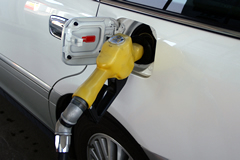Difference Between Petrol And Diesel Engine - Vol.208
Sitting at a gas station, you'll probably notice that they offer fueling options for both petrol and diesel engines. Both of these products are derived from petroleum, but they were designed for very different types of engines and cannot be used interchangeably in vehicles. Accidently filling your tank with one or the other could potentially clog up your fuel lines and prevent your car from operating altogether. So, what exactly is so different about petrol and diesel engines that makes these two separate gasoline types necessary?

Diesel Engines Have Higher Compression Ratios...
Petrol and diesel engines both work in similar fashions utilizing rotating pistons and crankshafts set off by internal combustion to get your vehicle moving. These combustions that make the vehicle move are a result of small explosions set off by the gasoline that is being stored in your fuel tank. In order to ignite the gasoline in a petrol engine, it must be combined with 8:1 part gasoline and then compressed; diesel engines on the other hand require a 20:1 ratio of much higher compression.
Petrol Engines Have Spark Plugs...
Diesel engines do not need spark plugs like petrol engines. Petrol engines compress the gasoline and air combination during at a certain point during the fuel injection stage immediately before the spark plug creates a burst of energy to ignite a flame and cause the combustion. Diesel engines compress the gasoline and air before this stage to such a level that the diesel fuel will generate higher levels of heat and spontaneously ignite, driving the pistons.
Diesel Engines Are Cheaper in the Long Run...
Initial purchasing costs and fuel prices are noticeably more expensive for diesel engines than gasoline, but the enhanced miles per gallon, amount of maintenance, and the lifetime of the vehicle outweigh this cost. Diesel engines don't need spark plugs or electrical boxes to ignite gasoline because the fuel undergoes spontaneous combustion with high levels of heat to power the engine. That means fewer parts to replace and fewer opportunities for something to potentially go wrong.
These engines can also do more with fewer resources because the compression is packed with so much more potential energy. Even though the fuel costs?for example?$0.60 more per gallon to fuel up, it may be able to take you around 60 miles-per-gallon whereas a traditional petrol engine could not accomplish the same feats. Lastly, high combustion ratios and the purpose of diesel known for powerful rigs result in a sturdier product being manufactured to meet these demands.
Petrol Engines Are Faster...
Diesel engines are designed with greater torque, which has to do with Isaac Newton's first law of motion regarding inertia. In order for an object to move out of a resting state, an unbalanced force needs to be acting upon it. That means that an engine with greater torque is going to be able to accelerate and get moving quicker than an engine with low torque. So in this case, diesel engines will leave the starting blocks quicker than a petrol engine.
Petrol engines have lower torque but they produce more power. Power is how much work a car is able to complete in a given amount of time. These vehicles are able to reach higher revolutions per minute and put off greater power as a result. If there was a race between a petrol and a diesel engine, the diesel engine would initially take the lead off the starting line, but would quickly get passed by the petrol as it is still trying to reach its maximum speed. Petrol engines are also much lighter giving them an additional edge.